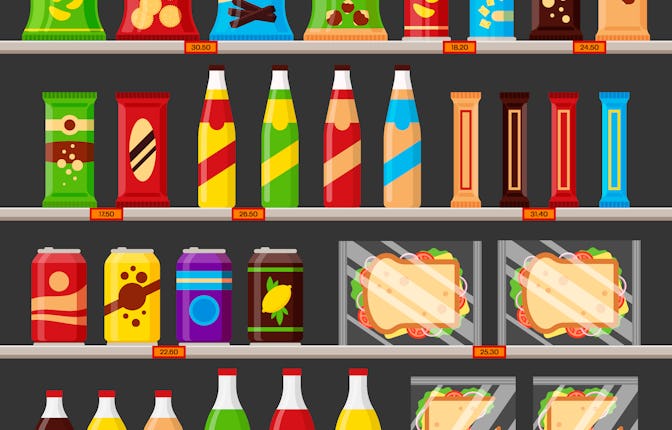Why the workers behind all your favorite snack brands are striking
Frito-Lay, Nabisco, and Kellogg’s have all been hit with worker walkouts as reports of terrible conditions come to light.

As 2021 rushes to an end, the coronavirus pandemic’s impact on the labor industry is once again in the spotlight as unions at massive corporations like Nabisco, Frito-Lay, and Kellogg go on strike. With so many moving parts at play behind these massive demonstrations, understanding the “why” behind workers at your favorite grocery brands striking might seem intimidating. But whenever I think about it, there’s one thing I can’t get out of my head.
Online, the rhyming couplet “Boss makes a dollar, I make a dime,” usually coupled with a gif of baby Elmo dancing on the potty, has become popular with the working class. Sure, it ends with “That’s why I poop on company time,” but overall the phrase speaks to growing frustrations with working conditions nationwide. Plus, it’s an introduction to the concept of big corporations being inherently exploitative — there’s no other phrase to use when someone gets rich off other people busting their asses — which has come up with union workers repeatedly.
In the midst of the pandemic, popular brands saw massive rises in sales as people stuck in lockdown turned to familiar snacks to get them through. Last year, Nabisco’s sales increased by 3% to $26.8 billion and Frito-Lay’s by 1.6% to $5.26 billion. Kellogg’s also reported massive growth. However, that extra money didn’t go into the pockets of those working 12- to 16-hour shifts or even 100 days straight to meet demand. At Kellogg’s, the company instead proposed a two-tier wage system that would have those on the lower tier making $11 or $12 less than their peers (with less vacation time and higher insurance premiums, too). Meanwhile, Kellogg’s CEO Steve Cahillane earned over $11.6 million in 2020.
There’s no good reason for a single person to earn millions while, as one Kellogg’s union worker said in an interview, “We feed all these families, but I can’t feed mine.” At the Frito-Lay plant in Topeka, Kansas, about 80% of the workforce went on strike this summer, citing poor pay as well. Labor Notes reported that in the past several years, wages hadn’t increased because most contracts only had lump sum bonuses. Monk Drapeaux-Stewart, who began working at the Topeka factory 16 years ago, told the outlet that he only received a 77-cent increase over the past 12 years.
While unions and strikes might be synonymous in some people’s minds, it’s not as if all organized labor strikes every day. In fact, the Frito-Lay union in Topeka, Local 218 of the Bakery, Confectionary, Tobacco Workers, and Grain Millers International Union, hadn’t gone on strike since 1973.
So, you might be wondering, why are all of these unions striking right now? One of the biggest reasons is actually pretty simple: the pandemic.
Yes, there’s a multitude of factors allowing for local unions to strike and a whole lot of nuance that you could dedicate several thousand words to. For example, workers at the three brands I’ve mentioned are all part of the BCTGM union, and every single local union on strike has been dealing with renewing contracts. After an old contract expires, corporations often try introducing harmful stuff like the aforementioned two-tier wage system, cutting benefits, or higher insurance premiums.
It’s no accident that these contracts are expiring around the same time. As Motherboard reported, union organizers at Nabisco set up contracts to expire in the summer in a tactic known as “contract line-up,” which allows for large private sector strikes. But at the end of the day, the pandemic is still a major driving factor. Just as each of the unions brought up poor pay, the terrible working conditions they also mentioned were exacerbated by the pandemic. At Frito-Lay, people often worked 84 hours a week without any days off. Due to labor shortages, Motherboard reported, they were also forced into adding four hours before or after their already-extended shifts — which workers referred to as “suicides.”
None of these unions are new to companies trying to slide some bullshit into an upcoming contract. But when you’re talking about people who are living through a whole global pandemic, doing so is a slap in the face on top of the brutal assault that the year already was. And at some point, people get tired of being hit.
As Rusty Lewis, a warehouse worker at the Nabisco distribution center in Aurora, Colorado, told Motherboard, “It’s gotten worse. It’s gotten horrible. Horrible hours. They don’t care about frontline workers. They only care about the almighty dollar. We’re tired of getting stepped on and treated like trash. We’ve had enough.”
While the pandemic served as a breaking point, it’s also offered workers some leverage. Due to labor shortages, union workers going on strike hurts a whole lot more than it might’ve a few years ago. Outside of brands like Nabisco, Frito-Lay, and Kellogg’s, we’ve seen low-wage workers using the pandemic to take back a little bit of power, like with fast food workers staging strikes of their own. After all, when you’re dealing with a giant — whether it’s McDonalds, Frito-Lay, or any other massive corporation — there’s no better time to finish them off then when they’re already on their knees.